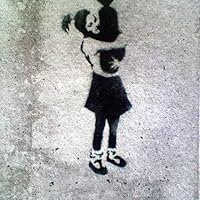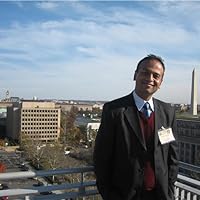Famine Quotes
Quotes tagged as "famine"
Showing 1-30 of 77

“People who get up early in the morning cause war, death and famine.”
― Banging Your Head Against a Brick Wall
― Banging Your Head Against a Brick Wall

“They want us to be afraid.
They want us to be afraid of leaving our homes.
They want us to barricade our doors
and hide our children.
Their aim is to make us fear life itself!
They want us to hate.
They want us to hate 'the other'.
They want us to practice aggression
and perfect antagonism.
Their aim is to divide us all!
They want us to be inhuman.
They want us to throw out our kindness.
They want us to bury our love
and burn our hope.
Their aim is to take all our light!
They think their bricked walls
will separate us.
They think their damned bombs
will defeat us.
They are so ignorant they don’t understand
that my soul and your soul are old friends.
They are so ignorant they don’t understand
that when they cut you I bleed.
They are so ignorant they don’t understand
that we will never be afraid,
we will never hate
and we will never be silent
for life is ours!”
―
They want us to be afraid of leaving our homes.
They want us to barricade our doors
and hide our children.
Their aim is to make us fear life itself!
They want us to hate.
They want us to hate 'the other'.
They want us to practice aggression
and perfect antagonism.
Their aim is to divide us all!
They want us to be inhuman.
They want us to throw out our kindness.
They want us to bury our love
and burn our hope.
Their aim is to take all our light!
They think their bricked walls
will separate us.
They think their damned bombs
will defeat us.
They are so ignorant they don’t understand
that my soul and your soul are old friends.
They are so ignorant they don’t understand
that when they cut you I bleed.
They are so ignorant they don’t understand
that we will never be afraid,
we will never hate
and we will never be silent
for life is ours!”
―

“War seems like a fine adventure, the greatest most of them will ever know. Then they get a taste of battle.
For some, that one taste is enough to break them. Others go on for years, until they lose count of all the battles they have fought in, but even a man who has survived a hundred fights can break in his hundred-and-first. Brothers watch their brothers die, fathers lose their sons, friends see their friends trying to hold their entrails in after they’ve been gutted by an axe.
They see the lord who led them there cut down, and some other lord shouts that they are his now, They take the wound, and when that’s still half-healed they take another. There is never enough to eat, their shoes fall to pieces from marching, their clothes are torn and rotting, and half of them are shitting in their breeches from drinking bad water.
If they want new boots or a warmer cloak or maybe a rusted iron half helm, they need to take them from a corpse, and before long they are stealing from the living too, from the small folk whose land they’re fighting in, men very like the men they used to be. They slaughter their sheep and steal their chickens, and from there it’s just a short step to carrying off their daughters too. And one day they look around and realize all their friends and kin are gone, that they are fighting beside strangers beneath a banner that they hardly recognize. They don’t know where they are or how to get back home and the lord they’re fighting for does not know their names, yet here he comes, shouting for them to form up, to make a line with their spears and scythes and sharpened hoes, to stand their ground. And the knights come down on them, faceless men clad in all steel, and the iron thunder of their charge seems to fill the world.
And the man breaks.”
― A Feast for Crows
For some, that one taste is enough to break them. Others go on for years, until they lose count of all the battles they have fought in, but even a man who has survived a hundred fights can break in his hundred-and-first. Brothers watch their brothers die, fathers lose their sons, friends see their friends trying to hold their entrails in after they’ve been gutted by an axe.
They see the lord who led them there cut down, and some other lord shouts that they are his now, They take the wound, and when that’s still half-healed they take another. There is never enough to eat, their shoes fall to pieces from marching, their clothes are torn and rotting, and half of them are shitting in their breeches from drinking bad water.
If they want new boots or a warmer cloak or maybe a rusted iron half helm, they need to take them from a corpse, and before long they are stealing from the living too, from the small folk whose land they’re fighting in, men very like the men they used to be. They slaughter their sheep and steal their chickens, and from there it’s just a short step to carrying off their daughters too. And one day they look around and realize all their friends and kin are gone, that they are fighting beside strangers beneath a banner that they hardly recognize. They don’t know where they are or how to get back home and the lord they’re fighting for does not know their names, yet here he comes, shouting for them to form up, to make a line with their spears and scythes and sharpened hoes, to stand their ground. And the knights come down on them, faceless men clad in all steel, and the iron thunder of their charge seems to fill the world.
And the man breaks.”
― A Feast for Crows

“Feel what it's like to truly starve, and I guarantee that you'll forever think twice before wasting food.”
― Killosophy
― Killosophy

“CHOW^TM contained spun, plaited, and woven protein molecules, capped and coded, carefully designed to be ignored by even the most ravenous digestive tract enzymes; no-cal sweeteners; mineral oils replacing vegetable oils; fibrous materials, colorings, and flavorings. The end result was a foodstuff almost indistinguishable from any other except for two things. Firstly, the price, which was slightly higher, and secondly, the nutritional content, which was roughly equivalent to that of a Sony Walkman.”
― Good Omens: The Nice and Accurate Prophecies of Agnes Nutter, Witch
― Good Omens: The Nice and Accurate Prophecies of Agnes Nutter, Witch

“I do not see how it is possible for a man to die worth fifty million of dollars, or ten million of dollars, in a city full of want, when he meets almost every day the withered hand of beggary and the white lips of famine. How a man can withstand all that, and hold in the clutch of his greed twenty or thirty million of dollars, is past my comprehension. I do not see how he can do it. I should not think he could do it any more than he could keep a pile of lumber on the beach, where hundreds and thousands of men were drowning in the sea.”
― The Liberty Of Man, Woman And Child
― The Liberty Of Man, Woman And Child

“. . . every society that grows extensive lawns could produce all its food on the same area, using the same resources, and . . . world famine could be totally relieved if we devoted the same resources of lawn culture to food culture in poor areas. These facts are before us. Thus, we can look at lawns, like double garages and large guard dogs, [and Humvees and SUVs] as a badge of willful waste, conspicuous consumption, and lack of care for the earth or its people.
Most lawns are purely cosmetic in function. Thus, affluent societies have, all unnoticed, developed an agriculture which produces a polluted waste product, in the presence of famine and erosion elsewhere, and the threat of water shortages at home.
The lawn has become the curse of modern town landscapes as sugar cane is the curse of the lowland coastal tropics, and cattle the curse of the semi-arid and arid rangelands.
It is past time to tax lawns (or any wasteful consumption), and to devote that tax to third world relief. I would suggest a tax of $5 per square metre for both public and private lawns, updated annually, until all but useful lawns are eliminated.”
―
Most lawns are purely cosmetic in function. Thus, affluent societies have, all unnoticed, developed an agriculture which produces a polluted waste product, in the presence of famine and erosion elsewhere, and the threat of water shortages at home.
The lawn has become the curse of modern town landscapes as sugar cane is the curse of the lowland coastal tropics, and cattle the curse of the semi-arid and arid rangelands.
It is past time to tax lawns (or any wasteful consumption), and to devote that tax to third world relief. I would suggest a tax of $5 per square metre for both public and private lawns, updated annually, until all but useful lawns are eliminated.”
―

“Here are two facts that should not both be true:
- There is sufficient food produced in the world every year to feed every human being on the planet.
- Nearly 800 million people literally go hungry every day, with more than a third of the earth's population -- 2 billion men and women -- malnourished one way or another, according to the United Nations Food and Agriculture Organization.”
― Rooms in the House of Stone
- There is sufficient food produced in the world every year to feed every human being on the planet.
- Nearly 800 million people literally go hungry every day, with more than a third of the earth's population -- 2 billion men and women -- malnourished one way or another, according to the United Nations Food and Agriculture Organization.”
― Rooms in the House of Stone

“Nobody knows how many North Koreans have died or are dying in the famine—some estimates by foreign-aid groups run as high as three million in the period from 1995 to 1998 alone—but the rotund, jowly face of Kim Il Sung still beams down contentedly from every wall, and the 58-year-old son looks as chubby as ever, even as his slenderized subjects are mustered to applaud him.”
― Love, Poverty, and War: Journeys and Essays
― Love, Poverty, and War: Journeys and Essays

“True the greater part of the Irish people was close to starvation. The numbers of weakened people dying from disease were rising. So few potatoes had been planted that, even if they escaped bight, they would not be enough to feed the poor folk who relied upon them. More and more of those small tenants and cottagers, besides, were being forced off the land and into a condition of helpless destitution. Ireland, that is to say, was a country utterly prostrated.
Yet the Famine came to an end. And how was this wonderful thing accomplished? Why, in the simplest way imaginable. The famine was legislated out of existence. It had to be. The Whigs were facing a General Election.”
― The Rebels of Ireland
Yet the Famine came to an end. And how was this wonderful thing accomplished? Why, in the simplest way imaginable. The famine was legislated out of existence. It had to be. The Whigs were facing a General Election.”
― The Rebels of Ireland
“Famine was the mark of a maturing agricultural society, the very badge of civilization.”
― Against the Grain: How Agriculture Has Hijacked Civilization
― Against the Grain: How Agriculture Has Hijacked Civilization

“She viewed ethnic cleansing, famine and genocide as direct threats to her furniture.”
― The God of Small Things
― The God of Small Things

“তবুও নিশ্চিত উপবাস
আমার মনের প্রান্তে নিয়ত ছড়ায় দীর্ঘশ্বাস-
আমি এক দুর্ভিক্ষের কবি,
প্রত্যহ দুঃস্বপ্ন দেখি, মৃত্যুর সুস্পষ্ট প্রতিচ্ছবি!”
― ছাড়পত্র
আমার মনের প্রান্তে নিয়ত ছড়ায় দীর্ঘশ্বাস-
আমি এক দুর্ভিক্ষের কবি,
প্রত্যহ দুঃস্বপ্ন দেখি, মৃত্যুর সুস্পষ্ট প্রতিচ্ছবি!”
― ছাড়পত্র

“In famine, a focus on women and children highlights biology: here is a mother who cannot feed her child, a breakdown in the natural order of life. This focus obscures who and what is to blame for the famine, politically and economically, and can lead to the belief that a biological response, more food, will solve the problem.”
― Hunger: An Unnatural History
― Hunger: An Unnatural History

“For the increase in the number of my Brennan cousins," Conall remarked dryly, "we must thank the potato.”
― The Rebels of Ireland
― The Rebels of Ireland

“A local phrase book, entitled Speak in Korean, has the following handy expressions. In the section 'On the Way to the Hotel': 'Let's Mutilate US Imperialism!' In the section 'Word Order': 'Yankees are wolves in human shape—Yankees / in human shape / wolves / are.' In the section 'Farewell Talk': 'The US Imperialists are the sworn enemy of the Korean people.' Not that the book is all like this—the section 'At the Hospital' has the term solsaga ('I have loose bowels'), and the section 'Our Foreign Friends Say' contains the Korean for 'President Kim Il Sung is the sun of mankind.'
I wanted a spare copy of this phrase book to give to a friend, but found it was hard to come by. Perhaps this was a sign of a new rapprochement with the United States, or perhaps it was because, on page 46, in the section on the seasons, appear the words: haemada pungnyoni dumnida ('We have a bumper harvest every year').”
― Love, Poverty, and War: Journeys and Essays
I wanted a spare copy of this phrase book to give to a friend, but found it was hard to come by. Perhaps this was a sign of a new rapprochement with the United States, or perhaps it was because, on page 46, in the section on the seasons, appear the words: haemada pungnyoni dumnida ('We have a bumper harvest every year').”
― Love, Poverty, and War: Journeys and Essays

“North Korea is a famine state. In the fields, you can see people picking up loose grains of rice and kernels of corn, gleaning every scrap. They look pinched and exhausted. In the few, dingy restaurants in the city, and even in the few modern hotels, you can read the Pyongyang Times through the soup, or the tea, or the coffee. Morsels of inexplicable fat or gristle are served as 'duck.' One evening I gave in and tried a bowl of dog stew, which at least tasted hearty and spicy—they wouldn't tell me the breed—but then found my appetite crucially diminished by the realization that I hadn't seen a domestic animal, not even the merest cat, in the whole time I was there.”
― Love, Poverty, and War: Journeys and Essays
― Love, Poverty, and War: Journeys and Essays

“Behjet eased the horse forward again. "The harvest is failing. There will be no crop at all if this rain doesn't stop - not even hay."
The rain. The rain she'd been so grateful for, the rain that concealed the warping of her shadow. It was going to kill people.”
― Plain Kate
The rain. The rain she'd been so grateful for, the rain that concealed the warping of her shadow. It was going to kill people.”
― Plain Kate

“BearPaw Duck Farm is prepared for famine, and we actually sell Leather Soup. It's flavored like shoes from 1933, and if you close your eyes while you slurp, you can taste my great grandpa walking around in them.”
― BearPaw Duck And Meme Farm presents: Two Ducks Brawling Is A Pre-Pillow Fight
― BearPaw Duck And Meme Farm presents: Two Ducks Brawling Is A Pre-Pillow Fight

“There will be no purple-haired feminists during the coming food famine. Soon, all women will find cattle ranchers to be the world's sexiest men.”
― I design saxophone music in blocks, like Stonehenge
― I design saxophone music in blocks, like Stonehenge
“Голод став зброєю масового знищення українців, на довгі десятиліття порушив їх природний генетичний фонд, призвів до морально-психологічних змін у суспільній свідомості. Був зруйнований традиційний український устрій життя.
Внаслідок Голодомору українське суспільство, стало і значною мірою досі залишається травмованим, постгеноцидним. Десятки мільйонів людей, які пережили Голодомор, пройшли через невимовні страждання і просто не могли відкинути цього досвіду. Їхній опір було зламано, а страх повторення Голодомору залишався на довгі десятиліття та призвів до втрати впевненості й ініціативності. На свідомому та підсвідомому рівні травма Голодомору передавалася від батьків до дітей.”
― Голодомор: Комуністичний геноцид в Україні
Внаслідок Голодомору українське суспільство, стало і значною мірою досі залишається травмованим, постгеноцидним. Десятки мільйонів людей, які пережили Голодомор, пройшли через невимовні страждання і просто не могли відкинути цього досвіду. Їхній опір було зламано, а страх повторення Голодомору залишався на довгі десятиліття та призвів до втрати впевненості й ініціативності. На свідомому та підсвідомому рівні травма Голодомору передавалася від батьків до дітей.”
― Голодомор: Комуністичний геноцид в Україні

“When you have been a victim of constant hunger, you learn how to stop wasting food.”
― Night of a Thousand Thoughts
― Night of a Thousand Thoughts
“There's magic in her bones. How can a witchcraft taste so holy at midnight!”
― The Devastating End Of Childhood: Because I’m a Girl
― The Devastating End Of Childhood: Because I’m a Girl
“Bir BM AJansı taradından yapılan çalışma, kadınlar kaynaklara erkeklerle aynı düzeyde erişme şansına sahip olsalardı, çiftliklerinde yüzde 20-30 daha fazla ürün yetiştirebileceklerini ve dünyadaki aç insanların sayısını yüzde 12-17 arasında azaltabileceklerini gösterdi.”
― How to Avoid a Climate Disaster, The New Climate War, The Rare Metals War 3 Books Collection Set
― How to Avoid a Climate Disaster, The New Climate War, The Rare Metals War 3 Books Collection Set

“Old man, if nature is generous, why this famine? He said, Blame human nature that makes merchants hoard and Churchill take our rice for his troops while we starve.”
― The Covenant of Water
― The Covenant of Water

“Abundance wears many faces. The got of plenty is also the god of decay. There can be no life without death, no feast without famine.”
― Six Scorched Roses
― Six Scorched Roses
All Quotes
|
My Quotes
|
Add A Quote
Browse By Tag
- Love Quotes 97k
- Life Quotes 75.5k
- Inspirational Quotes 72.5k
- Humor Quotes 43.5k
- Philosophy Quotes 29.5k
- Inspirational Quotes Quotes 27k
- God Quotes 26k
- Truth Quotes 23.5k
- Wisdom Quotes 23.5k
- Romance Quotes 23k
- Poetry Quotes 22k
- Death Quotes 20k
- Happiness Quotes 18.5k
- Life Lessons Quotes 18.5k
- Hope Quotes 18k
- Faith Quotes 18k
- Quotes Quotes 16.5k
- Inspiration Quotes 16.5k
- Spirituality Quotes 15k
- Religion Quotes 15k
- Motivational Quotes 15k
- Writing Quotes 14.5k
- Relationships Quotes 14.5k
- Life Quotes Quotes 14k
- Love Quotes Quotes 13.5k
- Success Quotes 13.5k
- Time Quotes 12.5k
- Motivation Quotes 12k
- Science Quotes 11.5k
- Knowledge Quotes 11k




